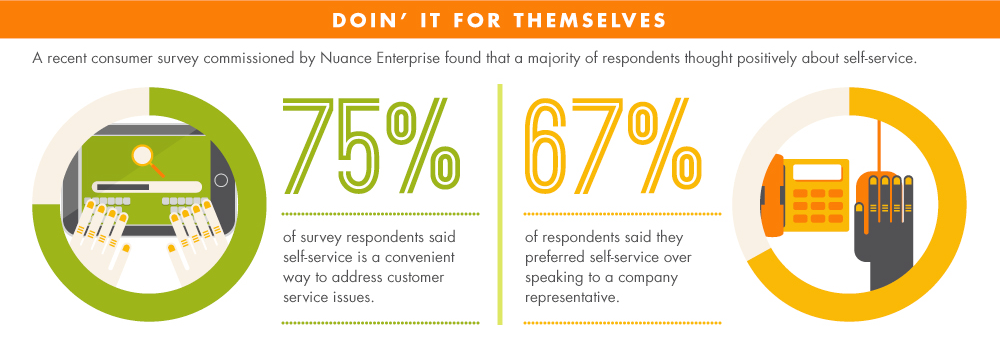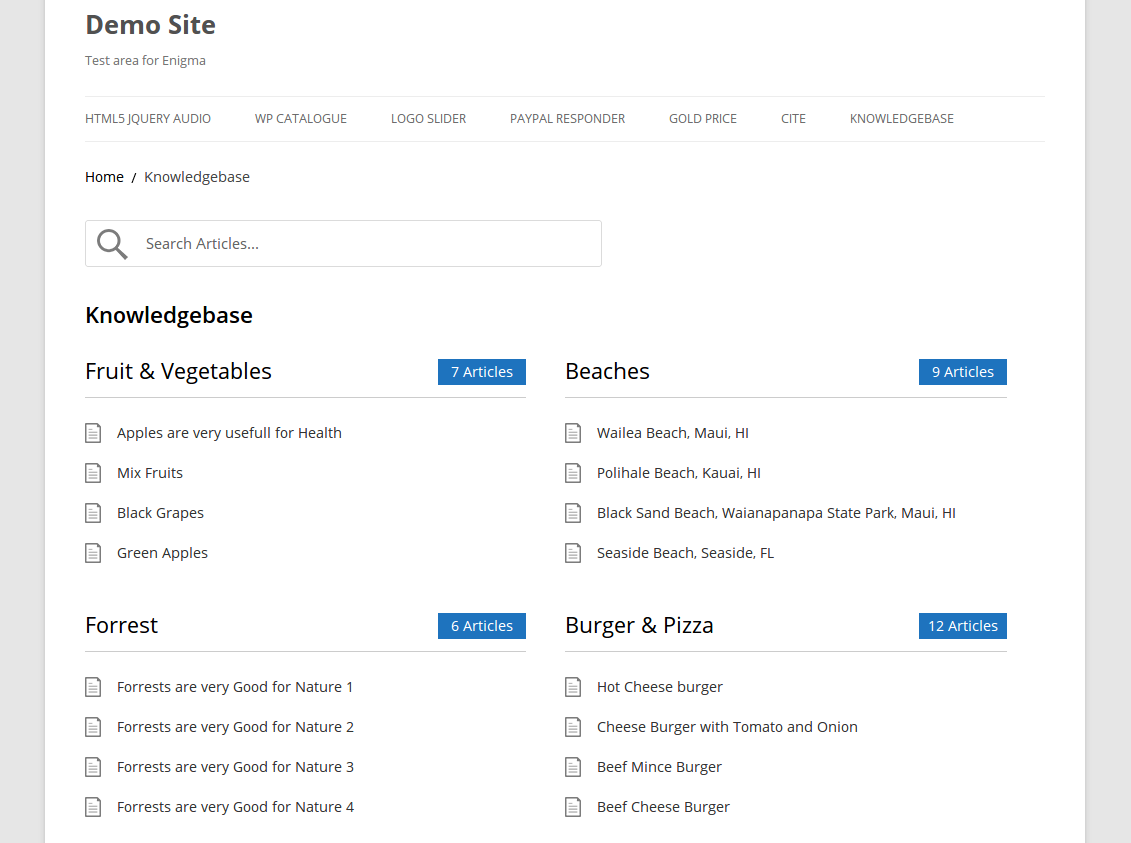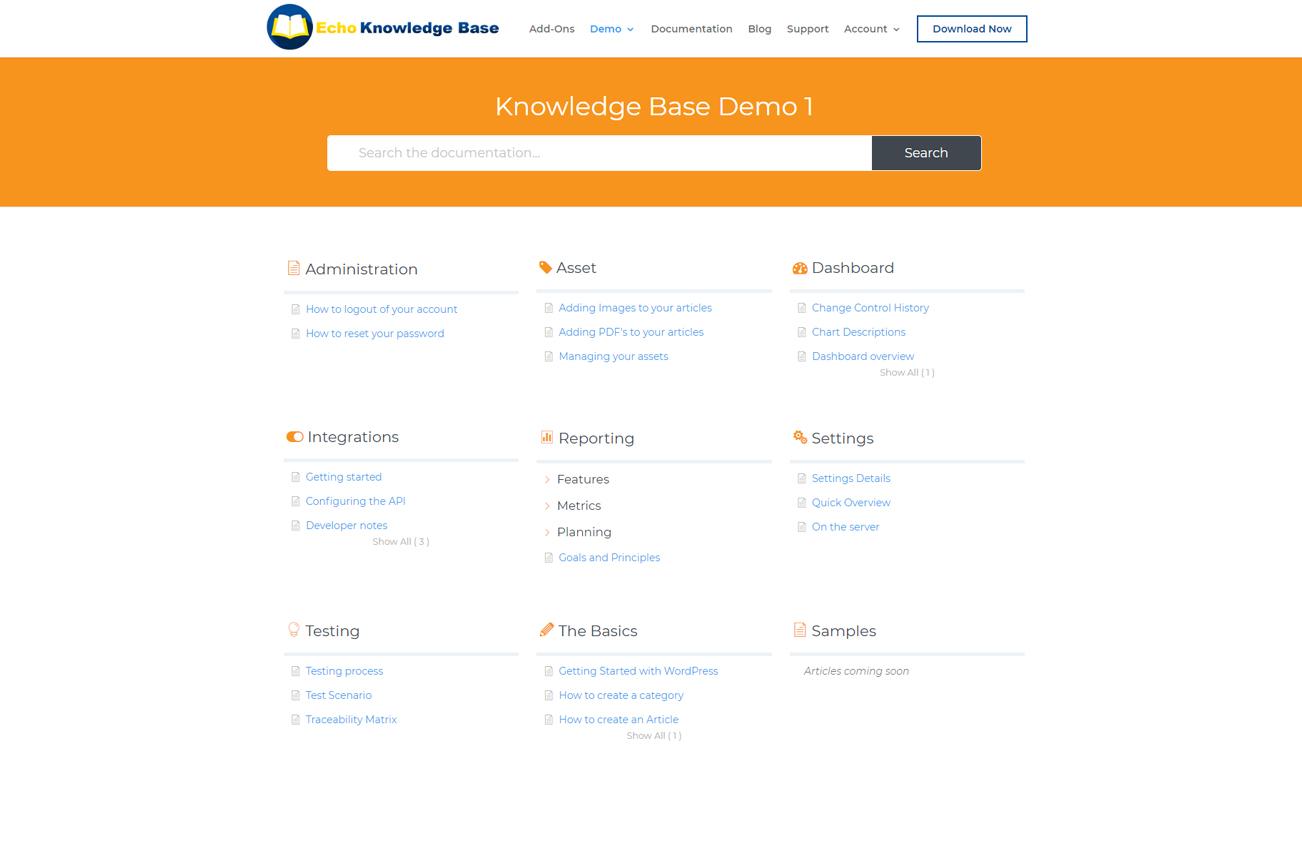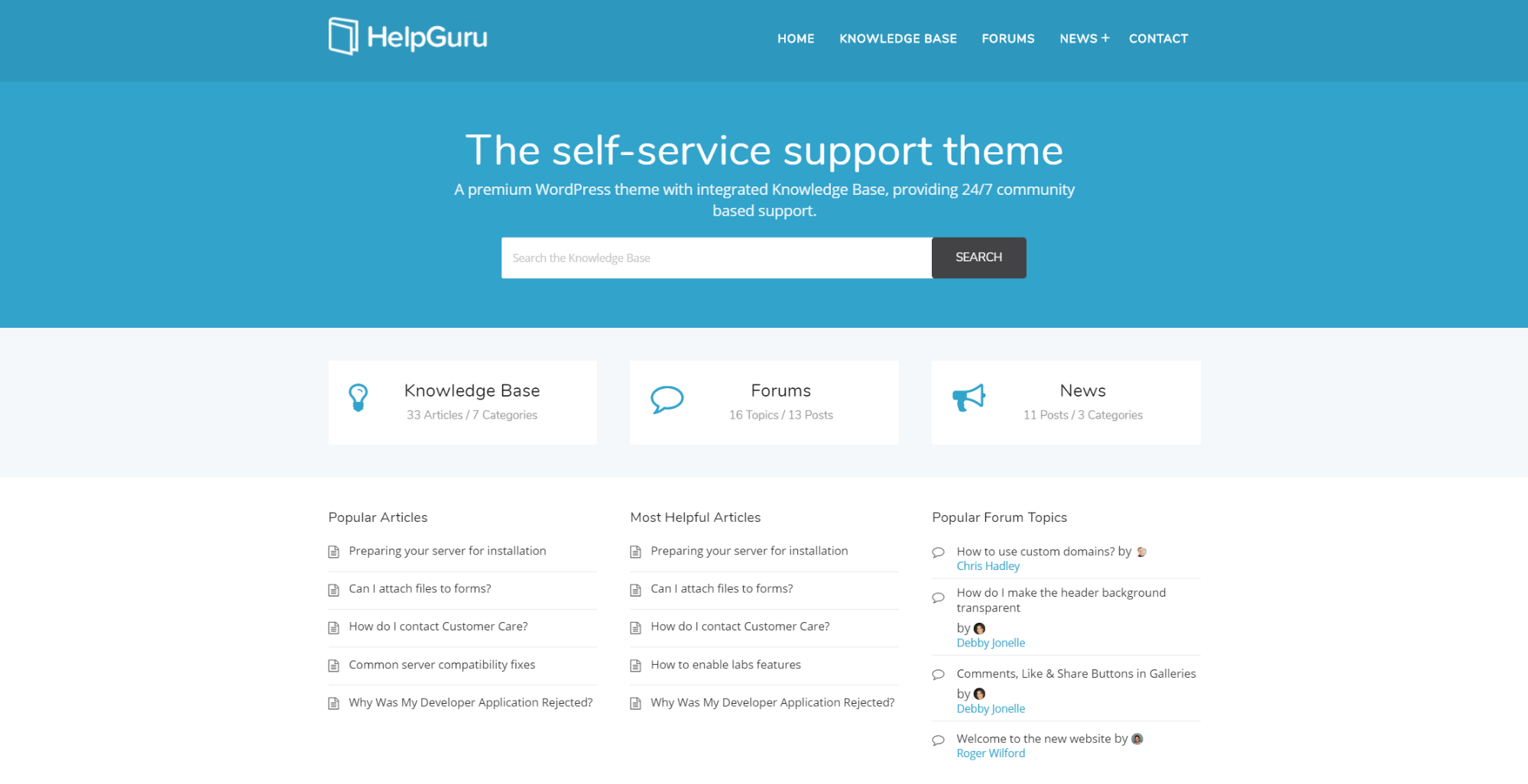Building a Knowledge Base With Wordpress

Should you use a WordPress knowledge base or not? We'll help you decide with this guide.
As an entrepreneur, you know the value of providing great customer service. After all, satisfied customers create more customers which results in a healthier bottom line for your business.
The key to keeping your customers happy is ensuring that they have access to the information they need to get the most out of your products or services.
When simple issues arise, offering support to customers via email or worse over the phone doesn't always leave the best impression.
That's where a knowledge base comes in.
According to a study by Nuance Enterprise, 75% of customers feel that the ability to find the solution to their issues on their own is a convenient method for handling customer support. Additionally, 67% of customers prefer self-service over speaking to a company representative.

(Source)
What's more, a study by Coleman Parks found that over 90% of customers said they'd use a knowledge base if it were available and tailored to their needs.
So, if you haven't got one, it's time to rethink your approach.
But before you launch into building a knowledge base, the first step is figuring out which platform or SaaS provider is the best for your needs.
There's a bunch of solutions out there and one of the most popular choices is WordPress combined with various extensions.
In this post, we'll analyze:
- The pros of using a WordPress knowledge base solution
- Using a theme versus a plugin
- Best WordPress themes for a knowledge base
- Best WordPress plugins for a knowledge base
- Some of the cons of using WordPress when creating a knowledge base
- Why you may want to consider using a SaaS solution for WordPress
By the end, you'll be equipped with all the knowledge base wisdom you need to make the best call for your customers and your business.
Benefits of Using a WordPress Knowledge Base
WordPress is the world's most popular content management system. So, it's unsurprising that they've got few things going for them when it comes to creating a functional knowledge base.
Let's examine 4 of the biggest benefits you'll get with WordPress:
1. Affordable Pricing
Compared to many knowledge base providers, a WordPress knowledge base is relatively cheap.
This is especially true if you're prepared to use the free or low priced plugins and themes that allow you to easily create a basic knowledge base.
WordPress itself is free, but there are still some costs associated with using it.
Hosting will set you back about $10-30 per month, a domain name will cost about $10 per year, a functional theme costs roughly $150, while a quality plugin is typically around $120.
So overall, you'd be looking at about $300 to get a basic WordPress knowledge base up and running.
However, if you intend on making heavy modifications to the code, be aware that development costs can quickly add up.
If you combine premium extensions with development work, the costs may actually end up being significantly higher than using a SaaS-based solution.
2. Great Customization
Because WordPress is open-source, you have access to the source code. This opens up a world of almost limitless possibilities when it comes to customization.
Especially when you consider the large pool of quality WordPress developers you can choose from.
Don't like the way your knowledge base looks? You can change it! Want to add extra functionality? No problem!
While this is awesome in many respects, it's important to be aware of the phenomenon known as 'feature creep'. This is the tendency for project requirements to increase during development beyond those originally foreseen.
When this happens, it's easy to end up with a bloated knowledge base with excessive features that actually end up detracting from your user's experience.
3. Self-Hosted
With WordPress, you host your own knowledge base. Many business owners prefer that their content be hosted on their own platform, rather than relying on a third-party to manage security.
With data breaches happening all the time these days, and rising concerns over how other companies are planning to profit from your data, self-hosting empowers you to take back a bit of control.
4. Easy to Set Up
If you already have an existing WordPress site then you won't need to spend any time retaining staff on how to use new systems.
Plus, many of the integrations and technical aspects can be handled through easy-to-install plugins.
Even if you're new to the platform, WordPress is very beginner-friendly and you won't have any trouble getting to grips with the intuitive backend dashboard and simple content management systems.
Should You Use A Theme or a Plugin?
If you want to set up a fully-functional knowledge base, standard WordPress posts aren't fit for the job.
Instead, you'll need to use one of two types of extension that can help:
- Themes
- Plugins
Both themes and plugins can help you build a solid knowledge base - but the results will be different with each approach. Neither is superior, it just depends on what you're looking for.
If you've already got a WordPress site, using a plugin means your knowledge base will integrate with your current WordPress install.
However, because the plugin isn't designed to fit with your theme, you'll probably need to do custom design work and theme-specific editing to create a professional and consistent feel.
Themes, on the other hand, will ensure that your knowledge base looks good from the get-go - even without any serious customization.
However, because your knowledge base will be a stand-alone theme, you'll need to either make your entire site a knowledge base or have a separate WordPress installation just to run it.
To reiterate, neither method is better, it all depends on the approach you're thinking about taking and the details of your current situation. Let's examine 3 plugins and 3 themes that you might consider using.
3 WordPress Knowledge Base Plugins Worth Considering
1. WP Knowledgebase

WP Knowledgebase is a free plugin that offers a decent number of options for colors, fonts and layouts. It's also super responsive, which means it quickly and automatically adjusts to fit the screen of your user across different devices.
There's no frills here, but if you're after a very basic knowledge base, WP Knowledgebase can get the job done.
2. Very Simple Knowledge Base

Very Simple Knowledge Base is a lightweight plugin with surprisingly powerful features. Customization is a little limited, but if you're looking for a quick and ultra-simple way to get your knowledge base off the ground, this is definitely worth a look.
3. Echo Knowledge Base

With 15,000+ users, Echo is the most popular knowledge base plugin on the WordPress platform. It comes with 26 ready made themes that you can customize to your liking.
And being a premium plugin, Echo also comes with useful features such as a search bar and up to five levels of hierarchical organization. It's not free, but it won't break the bank either.
3 WordPress Knowledge Base Themes Worth Considering
1. Helpguru

Helpguru is a knowledge base theme from developer Hero Themes. The theme customizer makes it super easy to create a professional feeling knowledge base, without messing around with code.
It's SEO friendly, fully responsive across mobile devices and allows users to leave feedback on articles so you can refine your content.
2. Flatbase

Flatbase is a solid knowledge base theme that comes loaded with useful features like an AJAX live search feature, bbPress integration, and attractive accordion-style FAQ templates.
It's also got good options for customization and comes with Google Fonts built-in.
3. KBase Knowledge Base

KBase comes with 7 pre-designed demos to choose from. The drag & drop visual composer makes creating an aesthetically pleasing knowledge base a breeze.
Plus, it's also WPML translation ready so you can easily translate articles into multiple languages.
The Drawbacks of A WordPress Knowledge Base
So far, we've covered the reasons why you might consider using WordPress to power your knowledge base.
But as with anything in life, it has its good aspects and its bad aspects. So, let's examine some of the less appealing aspects of the platform.
Potential For Slow Page Speed
As you add more and more plugins to your site, you increase the chances of delaying your loading times.
That's because they often require CSS and JavaScript files to be loaded on the page. This is bad news because the longer your page takes to load, the higher your bounce rate is going to be.
Without even going into how that'll affect your SEO score, literally the last thing you want frustrated customers to do is to impatiently wait as your knowledge base trudges into life on their mobile device.
Increased Vulnerability
Not all plugins are built to the best possible standards and many aren't updated often enough. This means that the wrong plugin can make your site a sitting duck for bad actors.
Especially when you consider that according to WP White Security, 54% of identified WordPress vulnerabilities come from plugins.
And while it's probably unlikely that any of the reputable knowledge base plugins would impact your site's security to a significant degree, it's worth keeping in mind nonetheless.
Technical Knowledge Required For Customization
While the open source nature of WordPress means you can enjoy almost endless possibilities when it comes to customization, you'll need significant knowledge of CSS (or pay a developer who does) to make changes to the source code.
Without it, your knowledge base will likely feel incongruent with the rest of your site, which isn't a good look.
Burdensome Product Support
Most of the free knowledge base extensions on WordPress come with product support, but it's typically not live product support.
Instead, customer support is handled through the medium of forums or email which means you may not receive timely responses to your queries.
Furthermore, if the issue you're having isn't related to a bug in the software, you'll be responsible for implementing the solutions which may involve technical knowledge.
This is in stark contrast to a SaaS solution where if you hit a snag, there'll be an expert there ready to make things right.
In addition, good software companies will continuously update and develop new features over time.
This means that instead of being stuck using an archaic system from 2014, you'll always be up to date with the current trends and running the latest version.
Free Plugins Usually Aren't Free
The whole point of a free plugin is that it doesn't cost any money. However, as touched on earlier, the vast majority of free themes won't fit your brand's image out of the box.
This means you'll have to spend a significant chunk of change modifying them to get a professional appearance that's consistent with the rest of your site.
It's worth calculating the total costs of the project before you take the plunge as you may find many SaaS solutions actually have a lower cost of ownership.
Not All Extensions Have The Essential Knowledge Base Features
While there are some great extensions out there, many of them lack the essential features that make a functional knowledge base such as:
- Powerful search functionality
- Simple & intuitive backend
- Smart categorization
- Easy authoring & formatting
- Analytics & reporting
- Easy Integration with existing software
- Professional customization
If you're thinking about using a plugin or theme that doesn't offer these six essentials, you'll end up with a sub-par knowledge base that won't deliver the results you're looking for, so choose wisely.
Are SaaS Knowledge Bases A Better Solution?
While we've seen that you can create a functional knowledge base using WordPress, it's always worth exploring all your options before making the final decision. One of the best alternatives is to choose a knowledge base SaaS provider.
In our (admittedly biased) opinion, opting for a SaaS solution is often a much easier approach than fumbling around with WordPress themes or plugins. Here's why:
Tailored to You
Unlike generic extensions, SaaS powered knowledge bases have the advantage of being custom-designed for your needs.
This means you'll get a tailored solution to fulfill exactly the purpose the software is intended for. No bloat, no fluff. Just a fully branded and customizable knowledge base that's dripping with professionalism.
Enhanced Workflow
In general, SaaS workflow systems are more sophisticated and give you greater control over your publishing and organization.
For example, many WordPress solutions don't have an approvals process which makes managing a team and publishing harder than it should be.
What's more, being able to do things like working with multiple versions of the same article and switching between them within the same editor is incredibly useful, but not something most WordPress knowledge bases allow you to do.
Powerful Analytics
You need to know how well your knowledge base is performing and what kind of return you're getting for your investment. High-quality SaaS solutions provide detailed analytics that'll let you measure your knowledge base's impact over time.
Solid analytics also help you improve over time. When you know things like what users are searching for and what kinds of content they're consuming you can troubleshoot articles and continuously improve your knowledge base to provide self-service assistance that's second to none.
Helpful Support & Ongoing Updates
As touched on earlier, SaaS products typically come with ongoing support and updates.
That means you'll never have to worry about falling behind your competition.
All of the backend hosting and maintenance is handled by your provider, freeing up more time for you and your team to focus on other tasks.
Plus, you'll also have the peace of mind that if anything goes wrong, there's a representative waiting to help you just a few moments away.
It's certainly a lot less stressful than dealing with the lackluster support that comes with many of the extensions on WordPress.
How to Build Out Your Knowledge Base
No matter whether you choose to build a knowledge base with WordPress or a SaaS product, it's important to understand that either is just a vehicle to provide your users with the content they need.
To put it another way, you could have the world's best knowledge base solution, but all the fancy features and tools won't count for squat if the content or structure stinks.
Because behind every effective knowledge base lies a heap of planning and time spent crafting uber-helpful articles that allow people to quickly find exactly what they're looking for.
For example, before you get started, you'll need to think about things such as...
- Who will read it?
- Who should write it?
- What kind of language should you use?
- What topics you need to cover?
- What's the best way to structure it?
- What visuals to include
And while it can seem daunting in the beginning, once you get started, the process tends to get easier. To get you going, we've created a selection of articles that'll lay the foundation for a world-class knowledge base. Find them here:
- Knowledge Base 101: What Is It And Why Should You Care?
- A Blueprint on How to Plan Your Internal Knowledge Base
- 26 Best Knowledge Base Examples
- Simple Guide on Writing Perfect Knowledge Base Articles
Bookmark each post and then come back and work your way through them as you build out your knowledge base. Once you're done, don't forget to sit back, prop your feet on the desk, and smile as your support tickets start to tumble!
Which Knowledge Base Solution is Right For You?
Ultimately, the decision to use either a WordPress knowledge base or a dedicated knowledge base software provider depends on what sorts of features you're looking for, your budget, your hosting preferences, your current website set-up, and so on.
Hopefully, this guide has been able to give you insight into the pros and cons of using WordPress to power your knowledge base, as well as examine why in our opinion a SaaS knowledge base might be a better move.
Remember there's no such thing as the perfect solution - the wisest move is to research many options before launching into building your own knowledge base.
With that in mind, why not kick-start the research process today by trying out Helpjuice for free? You can create your knowledge base in a couple of seconds, check out the features and see if it's the knowledge base you're looking for.
We're confident that you won't find a comparable solution anywhere else.
Building a Knowledge Base With Wordpress
Source: https://helpjuice.com/blog/wordpress-knowledge-base
0 Response to "Building a Knowledge Base With Wordpress"
Post a Comment